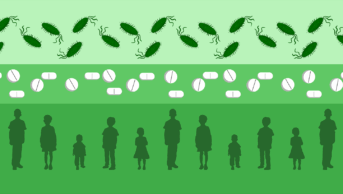
Shutterstock.com
Patients in NHS Suffolk and North East Essex Integrated Care Board (ICB) are being encouraged to return their unused medicines to local community pharmacies through a campaign to reduce medicines waste.
The campaign, which launched on 4 November 2024, uses social media, posters and a video to highlight that unused medicines across the UK cost the NHS an estimated £300m per year.
Speaking to The Pharmaceutical Journal, Tania Farrow, a medicines optimisation pharmacist at the ICB who is directing the campaign, said: “Waste medicines are something that our ICB has highlighted periodically, but we wanted to do something a bit more in depth.
“This year, the medicines optimisation team felt that it was something that we should tackle as a system, rather than just as an information campaign for patients. We have now launched the patient-facing aspect of the campaign.”
Farrow, who was formerly chief officer of Community Pharmacy Suffolk, added that the team used resources from PrescQiPP, which provides NHS organisations with evidence-based resources and training.
“They were very supportive of our campaign and we were able to make some minor changes that made the resources work perfectly for [NHS Suffolk and North East Essex],” she said.
“We were also inspired by the work that NHS Dorset had done and the outcomes that they had achieved, as highlighted at the PrescQIPP awards. They also have resources on their website, so there is lots of support available for areas wanting to run similar campaigns.”
Farrow said that now the patient-facing aspect of the campaign has launched, “we have further work to do in the new year, when we will be doing some co-production work with local patient groups to really understand why waste occurs from their perspective”.
“We hope that their insights will help us to ensure that our local repeat ordering processes are clear and patient-focused, and that everyone in our system knows what small changes we can all make to reduce medicines waste,” she added.
“We then hope to relaunch the patient-facing campaign next year, with all the learning we have gathered incorporated into that campaign, so we can maintain an ongoing focus.”
In October 2024, the Royal Pharmaceutical Society published a repeat prescribing toolkit, designed to help primary care teams in England streamline repeat prescribing systems and reduce medicines waste.
The toolkit was developed in response to the 2021 national overprescribing review report, which estimated that at least 10% of the current volume of medicines in England may be overprescribed, at a time when there were more than 1.1 billion prescribed items dispensed each year.
Read more: ‘Principles of sustainable healthcare in pharmacy practice’


